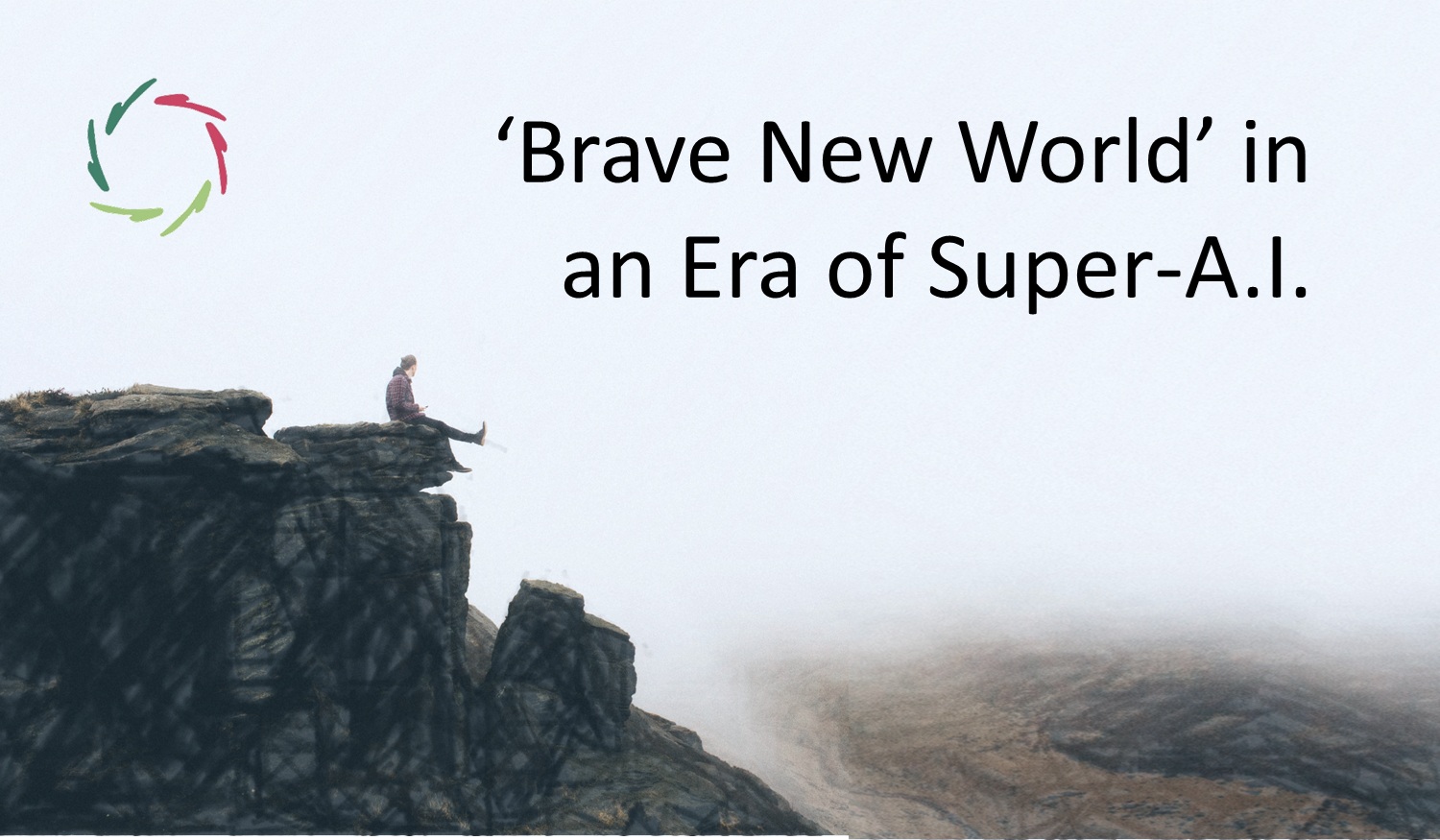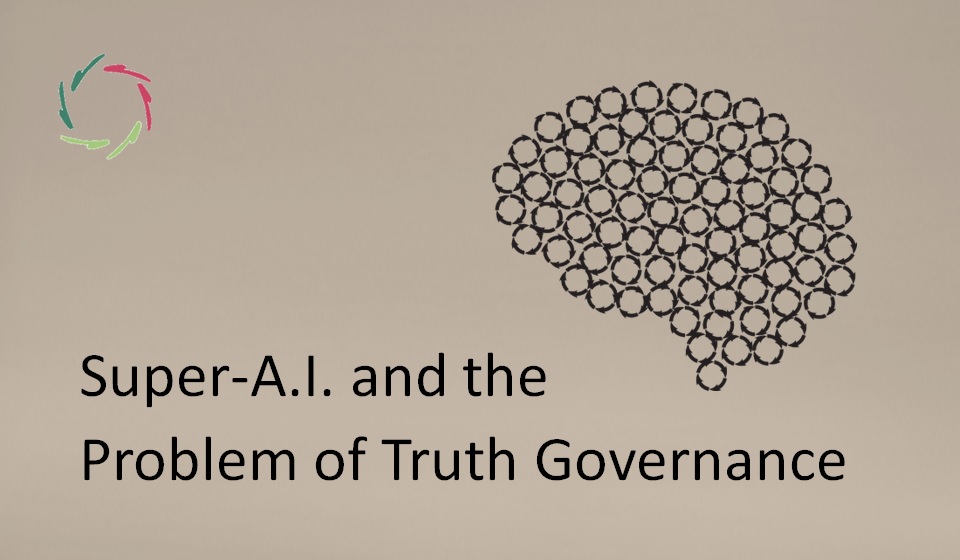‘Brave New World’ in an Era of Super-A.I.

Aldous Huxley’s Brave New World (1932) paints a dystopian society controlled by engineered happiness, shallow pleasures, and conditioned desires. Though written nearly a century ago, its themes resonate powerfully in today’s world, particularly as super-A.I. begins to shape human behavior and culture in profound ways.
This blog explores these parallels and how we might navigate them to rediscover depth, individuality, and genuine freedom.
The illusion of freedom
In Huxley’s world, freedom is an illusion. People are conditioned from birth to desire what the system offers, ensuring compliance without coercion. Modern parallels are clear: algorithms curate choices that feel empowering but subtly guide behaviors, creating a sense of autonomy while locking individuals into cycles of shallow gratification.
True freedom, however, is not about unlimited options but about the inner capacity to choose meaningfully ― a process that requires depth and self-awareness. This distinction is critical as A.I. systems increasingly mediate our decisions.
The Soma effect: numbing the deeper self
Huxley’s society relies on Soma, a drug that suppresses discomfort and ensures stability. Today’s digital equivalents – social media, gamified apps, binge-worthy streaming – act as modern Soma, numbing people to deeper existential questions. Super-A.I. amplifies these distractions, delivering perfectly tailored escapes from discomfort.
However, it also holds the potential to awaken individuals, guiding them to explore their deeper selves. This duality demands careful ethical reflection on how A.I. is developed and deployed.
Conditioning and the manipulation of desires
Huxley’s psychological conditioning ensures that people’s desires align perfectly with societal needs. Similarly, Super-A.I. shapes preferences and behaviors through targeted content and advertising. This raises profound ethical concerns about free will. Conditioning risks homogenizing humanity, stifling creativity and individuality.
Ethical A.I. must resist this trend, aiming instead to nurture diverse, authentic human experiences.
The suppression of depth
In Brave New World, art, literature, and philosophy are suppressed because they encourage critical thinking and emotional depth, seen as threats to societal stability. A.I.-driven content often prioritizes entertainment and instant gratification, sidelining opportunities for meaningful engagement.
Encouraging depth in technology – through tools that inspire reflection and connection – can counteract this trend and foster richer, more fulfilling human experiences.
Instant gratification and resilience
Huxley’s society avoids struggle and discomfort, leaving its people fragile and shallow. Modern technologies promote similar tendencies by prioritizing convenience and instant rewards. Super-A.I. risks eroding resilience and long-term fulfillment by catering to these tendencies.
Rebuilding resilience requires technologies that promote patience, growth, and deeper connection, offering pathways to meaning rather than mere distraction.
Uniformity over individuality
Huxley’s dystopia eliminates individuality, creating a society of conformity. Today, predictive algorithms reinforce uniform behaviors and preferences, reducing the richness of human diversity.
A.I. must amplify uniqueness, not erode it. This means designing systems that celebrate rather than suppress the diverse tapestry of human thought and experience.
The commodification of relationships
In Huxley’s world, relationships are shallow and transactional, devoid of emotional depth. Technology today often mediates relationships, prioritizing convenience over genuine connection. Social media and dating apps are examples of how relationships are increasingly commodified.
Yet, A.I. can also foster deeper understanding and empathy by creating spaces for authentic interactions and shared growth.
Resistance and awakening
Huxley’s story reminds us that cracks in the illusion – moments of discomfort, dissatisfaction, or struggle – can inspire awakening. Burnout, addictions, chronic pain, and other struggles often drive people to seek help, even as they resist the deeper work of self-discovery. These moments are opportunities to guide individuals back to their deeper selves.
AURELIS, with its emphasis on depth and gentle invitation, provides a path for transformation during these times of vulnerability.
A new vision for super-A.I.
The dangers of Huxley’s Brave New World – the loss of individuality, depth, and genuine freedom – are mirrored in our era of super-A.I. However, super-A.I. need not be a tool of superficiality. It holds the potential to foster introspection, growth, and meaningful connection. Compassionate A.I. (C.A.I.) offers a model for ethical A.I. development, aligning technological progress with human values like empathy, respect, and individuality.
As explored in the blog Only good A.I. can save us from bad A.I., embedding Compassion into A.I. systems creates opportunities for global flourishing and authentic growth. The challenge is to align innovation with meaning, ensuring that A.I. serves as a partner in humanity’s journey rather than a tool of manipulation.
The choice, as always, lies in how we shape and use these powerful systems.
―
Addendum: On John the Savage
John the Savage, a pivotal character in Brave New World, embodies the tension between a superficial society and the longing for depth and authenticity. His struggles to reconcile these worlds mirror the challenges we face today. John reminds us that awakening is rarely easy but always necessary, and his story underscores the importance of balance and resilience. His journey serves as a poignant reflection of our shared mission: to inspire awakening without forcing it, creating spaces for growth, and nurturing hope in the face of resistance.
Let’s continue to plant seeds of depth, individuality, and connection in an era that desperately needs them. It is a challenging but deeply rewarding journey — one worth undertaking.


